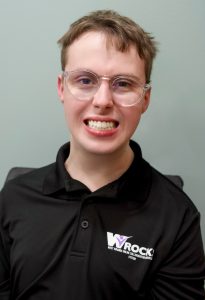Choosing your OER Tools: A Tool Look Book
4.1 Overview

Alex Keefover
instructional designer, WVROCKS
Alex is an instructional designer for West Virginia’s higher education course-sharing portal, WVROCKS. His favorite part of his job is creating engaging and fun learning experiences for students. He holds a B.S. with a major in Mathematics and a minor in Computer Science, as well as an M.Ed. majoring in Digital Media, New Literacies & Learning. Currently, he is working on an Ed.D. in Instructional Design & Technology.
His professional interests include STEM in online learning environments, online formative assessments, new literacies/technology education, accessibility/adaptability in instructional technology, eLearning content delivery systems/authoring tools, macro-level instructional design, and data analytics in learning.
Read more about Alex’s work at Learning by Keefover.
Accessible OER: Now More than Ever
It is always the hope that as we go through time our world will become more accessible, both to people with disabilities and those with financial challenges. These groups have a tendency to overlap. However, the more time progresses, the less textbooks and other publisher-provided material are financially and physically accessible.
Fewer Accessibility Services, Higher Costs
The Access Text Network that gave access to colleges and universities to alternative formats of publisher course materials for people with disabilities was shut down on April 1, 2024. Bookshare is now one of the only major services left to provide publisher textbooks in alternative formats for people with disabilities. Sure, people with disabilities can pay full price to buy or rent their books from publishers in accessible ebook format. However, this leaves an unfair advantage to students who do not need their books in alternative formats as they can buy their books used at a much lower price than the full retail price. Without services like the Access Text Network, turning used books into an accessible format requires a lot of workforce that the modern higher education institution does not have. This makes used books, the cheaper option for students, unusable for many disabled students who need books in alternative formats.
Closing the Equity Gap
So, how do we close this equity gap? One way to do this is to use principles from the Open Educational Resources (OER) and the Universal Design for Learning (UDL) movements. When we think of OER, we often revise, remix, and/or redistribute. These three foundations of OER grant freedom to edit and deliver content for our students without obtaining permission from the copyright holder. When applying the concepts of UDL to creating educational material, one thing we look to do with our content is to provide multiple means of representation (e.x. visual, auditory, kinetic, and multimodal formats).
Thus, for our educational content to be as universally accessible as possible, we often need to convert it to multiple formats. Traditional copyright can prevent us from putting others’ content into different formats. However, if content is published as OER, we can revise and remix the content to be in as many formats as we need it to be in. Further, we can redistribute the content in these different formats, so others do not have to redo the work of making the content as accessible as possible.
In conclusion, we are in an age where financial and human resources in higher education are dwindling at a rapid rate. Along with this, services we once relied on for alternative formats of publisher course material have ceased, making it harder for disabled students to utilize cheap, used textbooks. However, there is another option. Using concepts from the UDL movement, we can create OER that can be freely converted to address any student’s need and later posted for any person with the same need. Thus, closing equity gaps caused by publisher-created course materials.
Read more
- Olsen, S.H., et al. (2022) “Disability Tax and Accessibility TaxThe Extra Intellectual, Emotional, and Technological Labor and Financial Expenditures Required of Disabled People in a World Gone Wrong…and Mostly Online.” Including Disability, Issue 1, 51 – 86.
- Thomas, C. (2018). “OER and Accessibility: Working Toward Inclusive Learning,” SPARC*.
- Hofer, A. (2015). “The Intersection of Accessibility and OER”
Resource
ATNServices. (n.d.). Association of American Publishers. Retrieved May 9, 2024.
